Russia's targeting of 'enemies within' evokes ghosts of the Soviet past
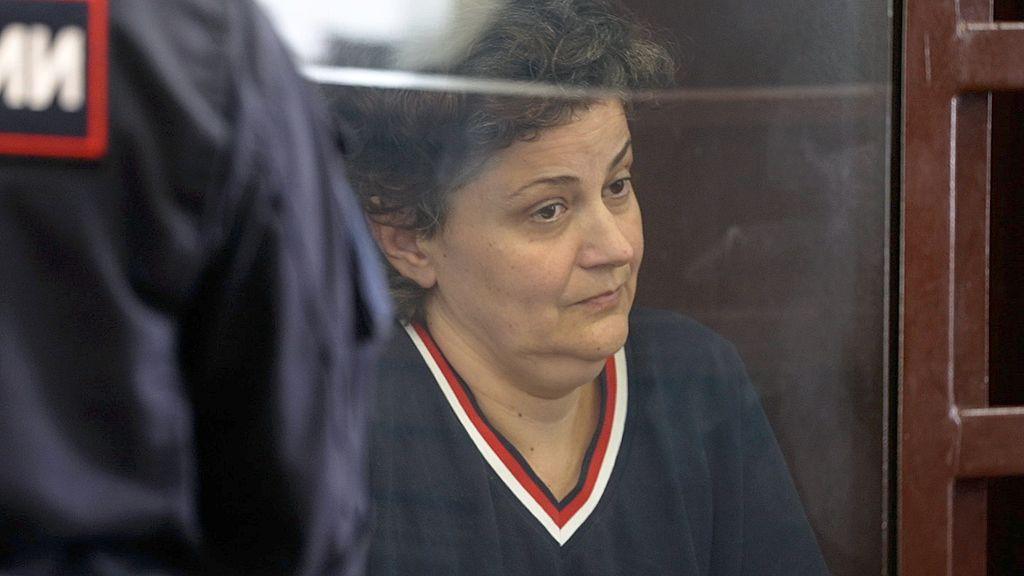
Anna Alexandrova is on trial for allegedly spreading fake news about the Russian army
- Published
I’m sitting in a courtroom in the town of Pushkin, 400 miles north-west of Moscow.
Opposite me is the “aquarium” - the glass and metal box where the defendant is locked, the courtroom cage that makes anyone on trial in Russia look like a dangerous criminal.
Behind the glass is Anna Alexandrova. The 46-year-old hairdresser has been charged with “the public dissemination of knowingly false information about the use of the Armed Forces of the Russian Federation”.
Put simply, spreading fake news about the Russian army. The charge relates to messages and social media posts she has been accused of sending.
The key prosecution witness is here, too - Anna’s neighbour.
Since Russia’s full-scale invasion of Ukraine there have been regular reports of Russians reporting neighbours, colleagues and acquaintances to the police over alleged anti-war statements.
Denunciations have led to arrests, prosecutions and, in some cases, long prison sentences.
But why has snitching become commonplace? And what are the implications for Russian society?
To find out, I have spoken to a number of Russians caught up in this, including a doctor informed on by her patient and an 87-year-old man who was forced off a bus and dragged to the police.

Listen to Steve Rosenberg on The Global Story podcast: The Russians snitching on each other for anti-war views
Back at the court in Pushkin, Anna Alexandrova’s neighbour, Irina Sergeyeva, is sitting two rows in front of me with her mother Natalya. They live in the house next to Anna’s.
The two families were once on good terms but have fallen out. Badly.
During a break in proceedings, I ask Natalya why.
“She started sending [my daughter] pictures from the special military operation [Russia’s war in Ukraine],” claims Natalya. “Images of soldiers' bodies torn apart, and tanks on fire.”
“I wrote to the prosecutor’s office about this,” Natalya adds. “The images make you want to cry.”
Anna denies sending any of the images and messages in question. According to her lawyer, if convicted, she faces up to 15 years in prison.
However, as I would discover, there was more to the tale of Anna and Irina than met the eye.
Signals from above
Free speech in Russia was already under attack, but days after the invasion of Ukraine in February 2022, Vladimir Putin took it to a whole new level.
A few days after ordering Russian troops into Ukraine for what he called a “special military operation”, President Putin signed into law repressive legislation designed to silence or punish criticism.
Russians could now be prosecuted for “discrediting the use of the Russian armed forces” and receive long prison sentences for spreading “knowingly false information” about the army.
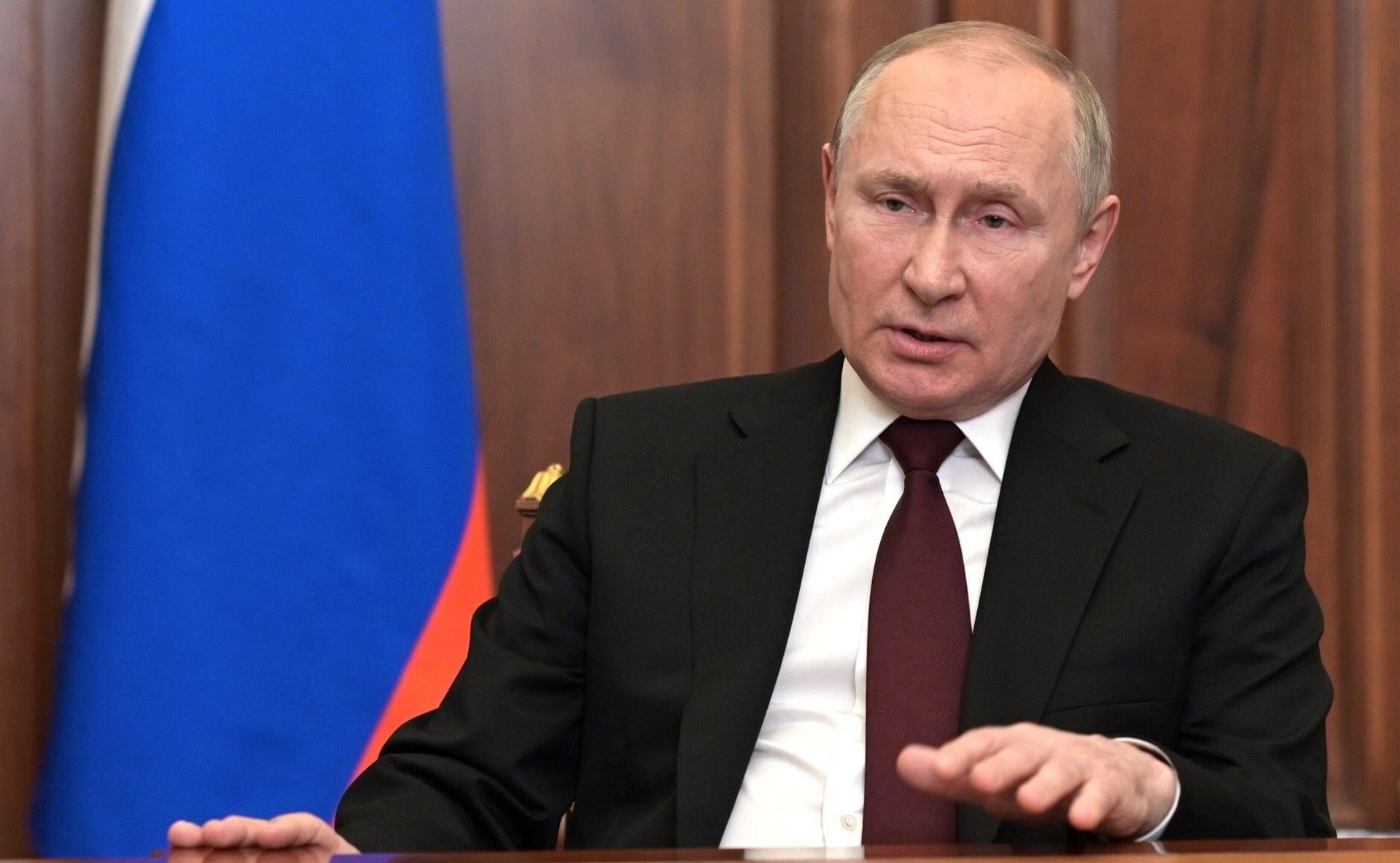
President Putin hinted a hunt for internal enemies would strengthen Russia
The authorities also signalled a hunt for internal enemies. President Putin declared:
“…any nation, and even more so the Russian people, will always be able to distinguish true patriots from scum and traitors and will simply spit them out like an insect in their mouth, spit them onto the pavement. I am convinced that a natural and necessary self-detoxification of society like this will strengthen our country, our solidarity and cohesion…”
In this atmosphere of “us” against “them”, reports started coming in of Russians snitching on Russians for opposing the war in Ukraine - of students informing on teachers, professors on students, work colleagues on each other.
Not all complaints have made it to court. But in some cases, Russia’s harsh new laws have been used to prosecute alleged offenders.
This has revived memories of the Soviet past when denunciation was actively encouraged by the authorities. Under dictator Joseph Stalin, the prison camps, or Gulag, were full of victims who had been snitched on by their fellow citizens.
“What I find remarkable is how quickly Russian genetic memory has come back, and how people who didn’t live in those times suddenly act as if they did,” says Nina Khrushcheva, a Russian-American professor of International Affairs at The New School in New York.
“Suddenly they are squealing on others. It is a Soviet practice but it’s also something about the Russian genetic code, of fear, of trying to protect themselves at the expense of others.”
Demons from below
But this is only half the story.
The more I learn about the case of the hairdresser, Anna, the more I realise that denunciation isn’t solely a product of fear and self-preservation.
Sometimes personal rivalries, or personal interest, are at play.
“The so-called ‘political’ articles of the criminal code have become a very convenient way to resolve conflicts between neighbours,” suggests Anna’s lawyer Anastasia Pilipenko.
“This particular case began with a run-of-the mill domestic squabble. One side went to the police but got nowhere. That only changed when the charge of ‘fake news about the army’ appeared.”
In reality, the conflict between Anna and Irina began, not with social media messages, but a row over land.
The two families had originally battled together to protect a local forest from developers. Things changed when Irina tried to rent a plot. She said she needed it for grazing goats.
“[Anna] harboured a grudge,” says Irina. “She called us fraudsters. She claimed we would buy the land and sell it on to developers. I told her that was nonsense. Then the floodgates opened.”
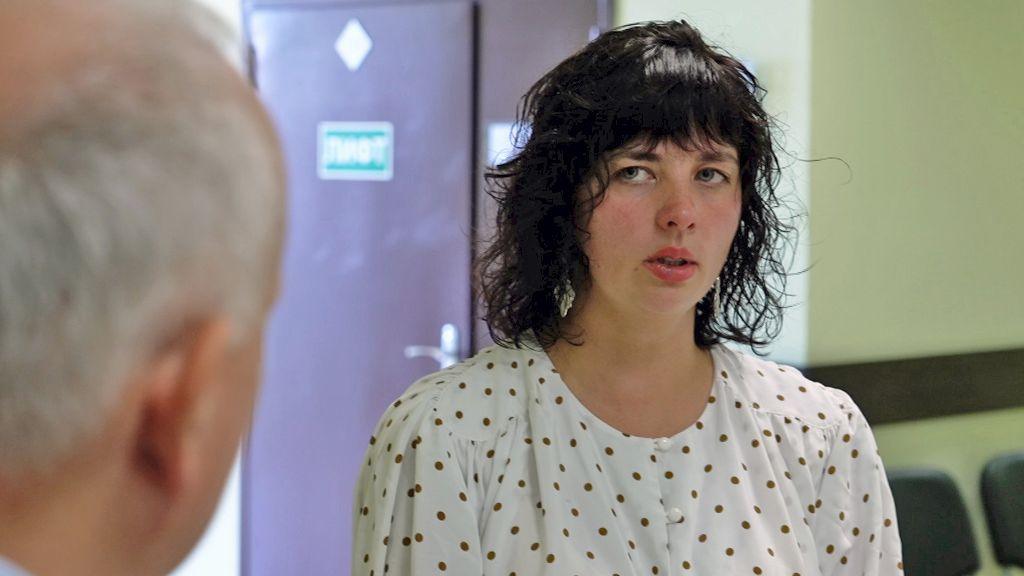
Anna's neighbour Irina says “crimes committed must be punished”
What happened next, as recounted by Irina and her mother, is as surreal and dark as a novel by 19th Century Russian writer Nikolai Gogol.
It is a story of neighbours at daggers drawn. It features a row about a fence, allegations of poisoned cutlets, slashed car tyres and other “dirty tricks”.
There are claims and counterclaims, accusations of jealousy, insobriety, fake social media accounts. Plus, an argument over the sale of rabbits.
Anna and Irina’s village, Korpikyulya, is remarkably quiet, considering. When I visit, I’m struck by the silence. There’s hardly a soul to be seen. But, as I stare across the fields, I have the strangest feeling, as if something is rising from the earth.
I close my eyes.
I recall a trip to Siberia, where climate change has been melting the permafrost, exposing skeletons, and releasing harmful bacteria and gases.
Suddenly it hits me. Something similar is happening here and across Russia. Two-and-a-half years of war, of parallel reality and parallel morality, are releasing demons from the depths of the Russian soul and society.
Russians even have a word for it, one they have borrowed from the Greeks - “khton”. It means something dark and evil, the monsters deep inside of us.
And when the demons from below mix with what is happening above, like repressive laws and the search for internal enemies, that is when you get neighbour reporting on neighbour.
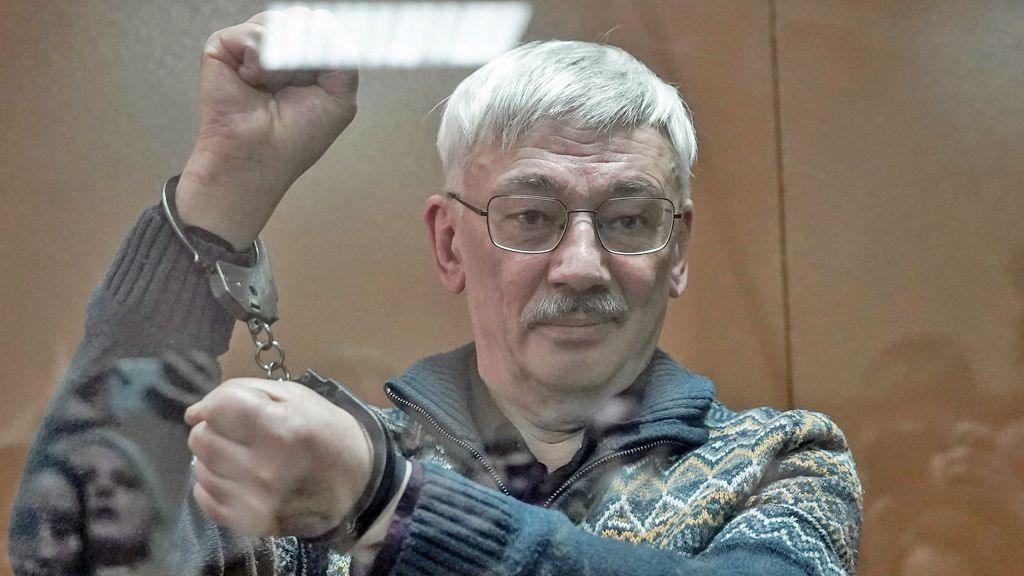
Veteran human rights campaigner Oleg Orlov was prosecuted for publishing an anti-war article
But surely Russia has no monopoly on monsters. For all the talk of a nation’s genetic code, human traits have no borders. We should not kid ourselves that denunciation is only possible in Putin’s Russia.
“I do not exclude lots of denunciations happening in Britain, if people there were to feel they could inform on opponents without any comeback and with the encouragement of the state,” says veteran human rights campaigner Oleg Orlov.
“It’s human nature. Unfortunately, lots of people try to destroy individuals they don’t like in their personal or public lives, using any means possible.”
Yet it was in Russia, not Britain, where Mr Orlov was denounced and prosecuted for an anti-war article he had published. Earlier this year he was convicted of “repeatedly discrediting” the Russian army and jailed for two-and-a-half years. He was then released early as part of a prisoner swap.
He concedes that “the Russian state is creating the kind of society in which people, who are informers by nature, feel happy and comfortable.”
Back at the courthouse in Pushkin, Anna’s trial is ongoing. With the hairdresser facing the prospect of years in prison, I ask Irina and Natalya whether they have any regrets.
“I feel sorry for her,” Natalya says. “I could cry.”
“Crimes committed must be punished,” says Irina.
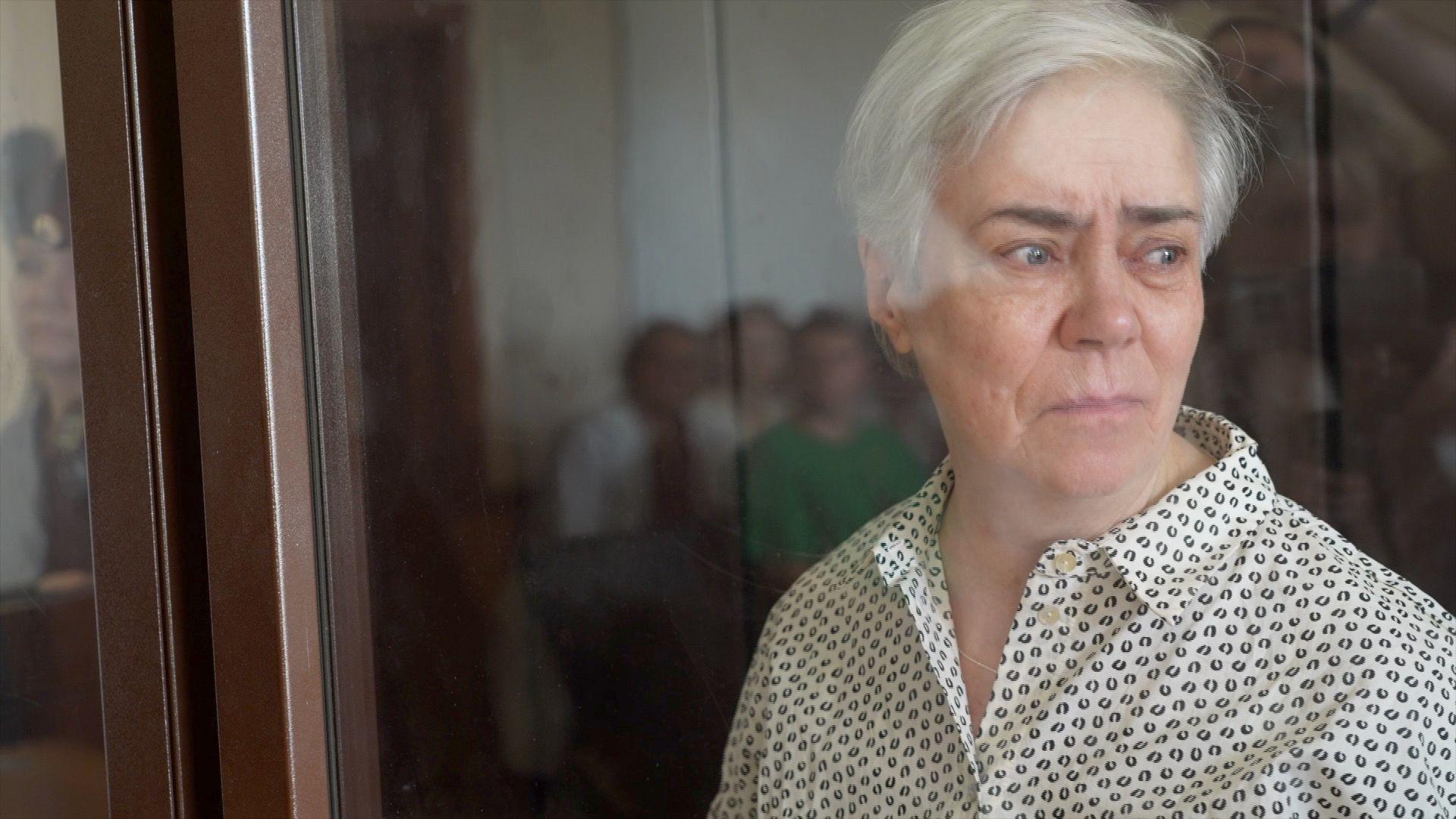
Paediatrician Nadezhda Buyanova, who is also being tried for spreading “fake news”, says she never thought it would happen to her
I’m at another trial, this time in Moscow.
Locked in the cage is 68-year-old paediatrician Nadezhda Buyanova. She, too, has been accused of spreading “fake news” about the Russian army.
“I’ve read about this kind of thing happening to others,” Nadezhda tells me through the glass. “I never imagined it would happen to me.”
The mother of a patient claims the doctor told her that Russian soldiers in Ukraine were legitimate targets. The woman, whose ex-husband had been killed fighting in Ukraine, recorded an angry video and reported Nadezhda to the police.
“Buyanova denies the accusations,” Nadezhda’s lawyer Oskar Cherdzhiev tells me. “It’s an unusual case because, essentially, there is no evidence other than one person’s word against another. It could set a bad precedent whereby one person’s testimony is enough to make someone suffer.”
But Nadezhda has supporters here, including a former patient and a paramedic.
“I’ve travelled down from St Petersburg because it’s so important for me to back a colleague,” ambulance medic Vera Rebrova tells me. “This is a trumped-up charge. I sympathise with her very much.”
Speaking from the “aquarium”, Nadezhda tells me how much she values the display of solidarity.
“The fact that I’m not abandoned, not alone, that people are thinking of me, it means so much,” she says.
It also shows that, despite the fear in society, some Russians are taking a stand against snitching and the direction in which their country is moving.
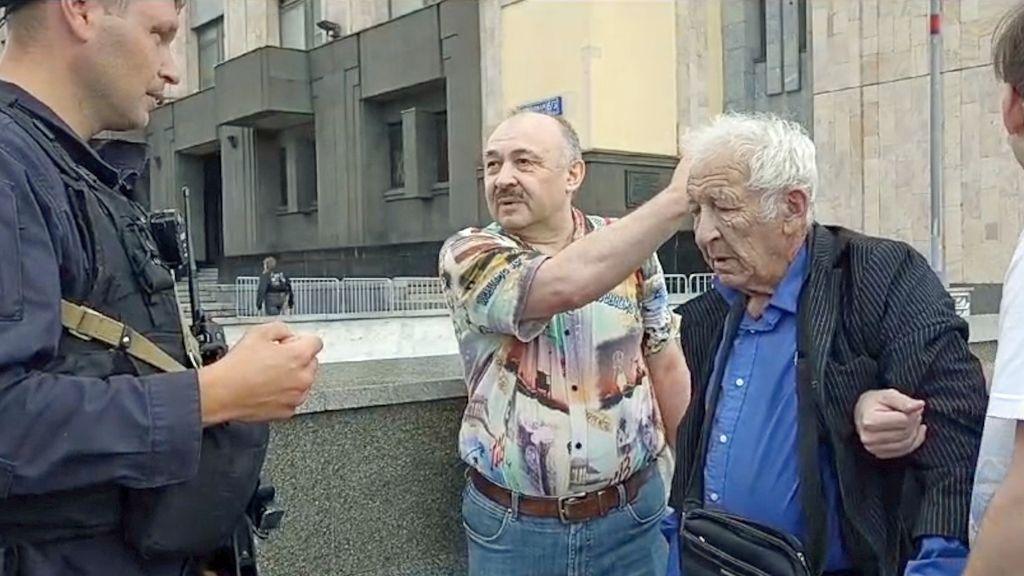
Dmitry Grinchy, 87, was assaulted on a Moscow bus and marched to police officers
Among those willing to speak out is 87-year-old Dmitry Grinchy, who has invited me to tea. He tells me what happened to him recently on a Moscow bus.
A passenger claimed to have overheard Dmitry making insulting comments about Russian mercenaries fighting in Ukraine and physically attacked him.
“He lunged at me, flashing his eyes and gnashing his teeth as if he wanted to bite me,” Dmitry recalls. “He called over his son, a big guy, who pressed his finger into my arm to hurt me. I’ve got bruises.”
Shocking mobile phone video shows the pensioner having his arms twisted behind his back and being dragged off the bus. The two men frogmarched Dmitry to the police. He was not charged. But the incident has left Dmitry shaken and angry.
“The Russian Constitution says everyone has the right to free speech. Why should others get to say what they think and not me?”
Under Joseph Stalin, Dmitry’s father was arrested and executed, one of the many innocent victims of Stalin’s Terror.
Russia’s past is a painful one.
But it is the present that worries Dmitry. With the authorities here, once again, searching for enemies and traitors - and the public encouraged to join in the hunt.